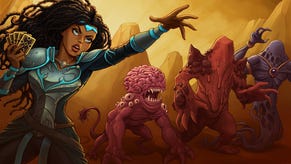The irony of Oddworld
Lorne Lanning on crunching to make games about the exploitation of workers
The 1997 PlayStation-exclusive Oddworld: Abe's Oddysee is very clearly concerned about the exploitation of workers. It centers on the Mudokons, a race that has been enslaved and forced to work in factories by a ruthless company willing to literally putting them through the grinder in an attempt to boost profits.
Clearly, creative director Lorne Lanning has some opinions about capitalism, and he's not exactly shy about it.
But Lanning is also the co-founder of the company behind the game, Oddworld Inhabitants. He was the boss of a company making a video game for profit, in an era where crunch and overwork were pervasive, when the subjects were talked about as virtues in the press on the rare occasions they were mentioned at all.
The idea of exploiting workers in order to tell a story condemning the exploitation of workers is grimly ironic to put it mildly, so when we sit down at E3 to speak with Lanning and Oddworld executive producer Bennie Terry III, we ask what crunch was like for Oddworld on Abe's Oddysee, and if it's improved since.
"It was always terrible," Lanning admits. "And it's still terrible. It's not a burden we try to put on every individual, but for Bennie and I, it's just terrible. And different people at different times rise to the occasion."

He says the idea of a 9-to-5 job in game development is increasingly possible, particularly for "huge companies that have mega-IPs that are doing billions and billions of dollars." Even so, he adds it doesn't seem to be a very common situation for developers.
"The audience is absolutely ruthless, and we should never suspect for a second that they're not... They don't care how many people died making the product"
"I mean, we're past EA Spouse," he says, referring to a 2004 LiveJournal post from the wife of an EA employee detailing numerous issues with the company's treatment of workers. "We're past that, where everyone realized they were basically being exploited for the extreme gain of a select few of the executive class. That's still going on in different places in the world."
Ultimately, Lanning says the problem of crunch in games stems from its nature as an entertainment business.
"I tell this to people we work with all the time, particularly young people," Lanning says. "You have to realize something: we are a luxury class. We're not doing anything important. The important people are picking up your garbage, fixing your medical problems, growing your food, supplying electricity. Those are the important people in civilization; they actually provide a benefit. We're just entertaining people. It's complete luxury; they don't need us."
On top of that, Lanning says entertainment media are in a difficult position because the audience is concerned only with the end product, not the methods of its production.
"No one wants to say, 'This product was done by people who worked 9-to-5, and they all had great healthcare, weekends off, three weeks of vacation, and everyone had that. Here you go.' If it's not great, everyone goes, 'Who cares? Why didn't they lose some fucking sleep to get it done and get it better?'
"The audience is absolutely ruthless, and we should never suspect for a second that they're not. They're absolutely ruthless. They don't care how many people died making the product. [laughing] I mean literally. They don't care. We're ruthless with how we spend our money. We live in a culture that's based on 'Wal Mart's cheaper. Let's go there for our stuff. Amazon Prime delivers without shipping costs. Let's go there.' And that shapes our world. At the end of the day, it's about the quality of what's on screen."
He likens it to athletes who want to win Olympic gold. They're expected to sacrifice to achieve that goal, from strict diet and exercise regimens to not having a dating life.
"I don't believe there's anyone you could talk to who built anything in this business who didn't really persevere night and day to get it done"
"In entertainment, if you want real stability -- and this is where I feel I'm just being honest and not necessarily saying what's politically correct -- if you want to make entertainment that stands out, show me where you can do that where people don't put everything in to get there," Lanning says. "The only ones that are able to do that are the ones who have reached the bar where they now have perfection."
He points to Pixar as an example, saying the animation studio has never had a film that wasn't a hit (although he adds some were bigger than others).
"In the beginning, if you watch [Pixar executive] John Lasseter's videos, he [points to a corner of the room and says], 'And that's my sleeping bag. And that's where I sleep to get these projects done. And if you want to be a great animator, that's what you're going to do too.' That's the legacy of entertainment."
He adds, "I don't believe there's anyone you could talk to who built anything in this business who didn't really persevere night and day to get it done. I've been doing that my entire career. I've had health issues because of it. I wish it weren't that way, but it kind of is."
Lanning asks if we've seen Bohemian Rhapsody. When we say no, he asks if we have a problem with Queen, the band the film was about. We love Queen, we say, but weren't interested in a film that played so fast and loose with the facts.
"Maybe, but see, this is Hollywood," Lanning says. "We're not trying to replicate what was actually true, we're just trying to make something that's inspiring, that you felt was a moving experience."
He then talked about an inspirational scene of the band working through the night to create the song Bohemian Rhapsody.
"Usually with great art, that's what it takes," Lanning says. "I think it was Martha Graham, the founder of modern dance, who said the dilemma of being an artist is living with the dissatisfaction of feeling like nothing is ever complete, done, or as good as it could be. And I think that goes for designers, for directors, for people that are really craftsmen in an artistic sense. The ambitious team is usually going to beat the unambitious team unless you're so fat, like some of the biggest media companies are so fat they can fail and still succeed because they just keep throwing money and bodies at the project."

Given that Abe's Oddysee and the upcoming Oddworld: Soulstorm are about the player character's attempts to organize an exploited labor force to gain power against their oppressors, we finish the interview by asking Lanning about his stance on unions.
"It's kind of like my stance on the death penalty," Lanning says. "Philosophically, I'm fine with the death penalty. I think lots of people deserve not to be here with the rest of us. Practically, I'm concerned about who has that power. If we have such a thing, is it going to be abused and are we just going to shut up political dissidents and stuff like that? Unions are kind of similar.
"My stepfather was a teamster. I saw a lot of things and heard a lot of stories about unions through there. Part of the problems with unions is that they start to encapsulate power and use that in a different way that becomes counterproductive, possibly sometimes, to the industry they're trying to unionize. If we lived in a really healthy, honest world where everyone was fair, we wouldn't need them. But because it's not a fair world, sometimes we do. What would happen to this industry is it would put out most of the small people, but the big ones would survive just fine."
This is the second part of our E3 Oddworld discussion. The first part ran earlier this week.









